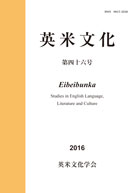34 巻
選択された号の論文の20件中1~20を表示しています
- |<
- <
- 1
- >
- >|
-
原稿種別: 表紙
2004 年 34 巻 p. Cover1-
発行日: 2004/03/31
公開日: 2017/06/20
PDF形式でダウンロード (1421K) -
原稿種別: 付録等
2004 年 34 巻 p. App1-
発行日: 2004/03/31
公開日: 2017/06/20
PDF形式でダウンロード (4K) -
原稿種別: 目次
2004 年 34 巻 p. Toc1-
発行日: 2004/03/31
公開日: 2017/06/20
PDF形式でダウンロード (29K) -
原稿種別: Article
2004 年 34 巻 p. 5-19
発行日: 2004/03/31
公開日: 2017/06/20
PDF形式でダウンロード (800K) -
原稿種別: 本文
2004 年 34 巻 p. 21-34
発行日: 2004/03/31
公開日: 2017/06/20
PDF形式でダウンロード (1001K) -
原稿種別: Article
2004 年 34 巻 p. 35-50
発行日: 2004/03/31
公開日: 2017/06/20
PDF形式でダウンロード (925K) -
原稿種別: 本文
2004 年 34 巻 p. 51-61
発行日: 2004/03/31
公開日: 2017/06/20
PDF形式でダウンロード (760K) -
原稿種別: 本文
2004 年 34 巻 p. 63-77
発行日: 2004/03/31
公開日: 2017/06/20
PDF形式でダウンロード (972K) -
原稿種別: 本文
2004 年 34 巻 p. 79-105
発行日: 2004/03/31
公開日: 2017/06/20
PDF形式でダウンロード (10329K) -
原稿種別: 本文
2004 年 34 巻 p. 107-126
発行日: 2004/03/31
公開日: 2017/06/20
PDF形式でダウンロード (1399K) -
原稿種別: 本文
2004 年 34 巻 p. 127-150
発行日: 2004/03/31
公開日: 2017/06/20
PDF形式でダウンロード (1462K) -
原稿種別: 本文
2004 年 34 巻 p. 151-163
発行日: 2004/03/31
公開日: 2017/06/20
PDF形式でダウンロード (827K) -
原稿種別: Article
2004 年 34 巻 p. 165-178
発行日: 2004/03/31
公開日: 2017/06/20
PDF形式でダウンロード (742K) -
原稿種別: 本文
2004 年 34 巻 p. 179-199
発行日: 2004/03/31
公開日: 2017/06/20
PDF形式でダウンロード (1355K) -
原稿種別: 付録等
2004 年 34 巻 p. 201-
発行日: 2004/03/31
公開日: 2017/06/20
PDF形式でダウンロード (53K) -
原稿種別: 付録等
2004 年 34 巻 p. 201-
発行日: 2004/03/31
公開日: 2017/06/20
PDF形式でダウンロード (53K) -
原稿種別: 付録等
2004 年 34 巻 p. 202-
発行日: 2004/03/31
公開日: 2017/06/20
PDF形式でダウンロード (31K) -
原稿種別: 付録等
2004 年 34 巻 p. App2-
発行日: 2004/03/31
公開日: 2017/06/20
PDF形式でダウンロード (11K) -
原稿種別: 表紙
2004 年 34 巻 p. Cover2-
発行日: 2004/03/31
公開日: 2017/06/20
PDF形式でダウンロード (250K) -
原稿種別: 表紙
2004 年 34 巻 p. Cover3-
発行日: 2004/03/31
公開日: 2017/06/20
PDF形式でダウンロード (250K)
- |<
- <
- 1
- >
- >|
